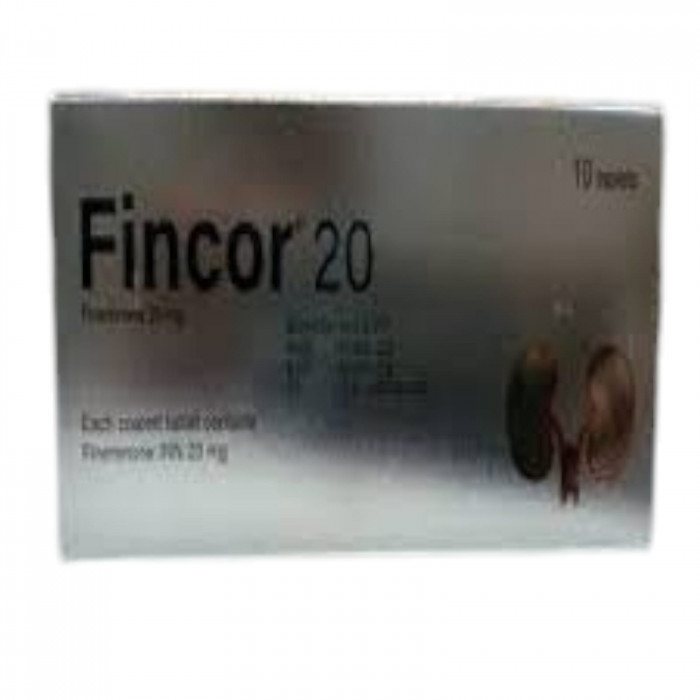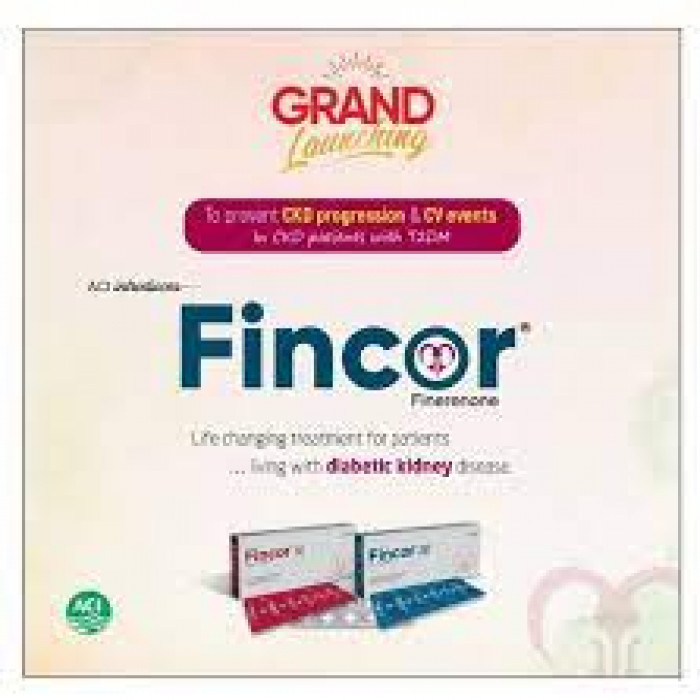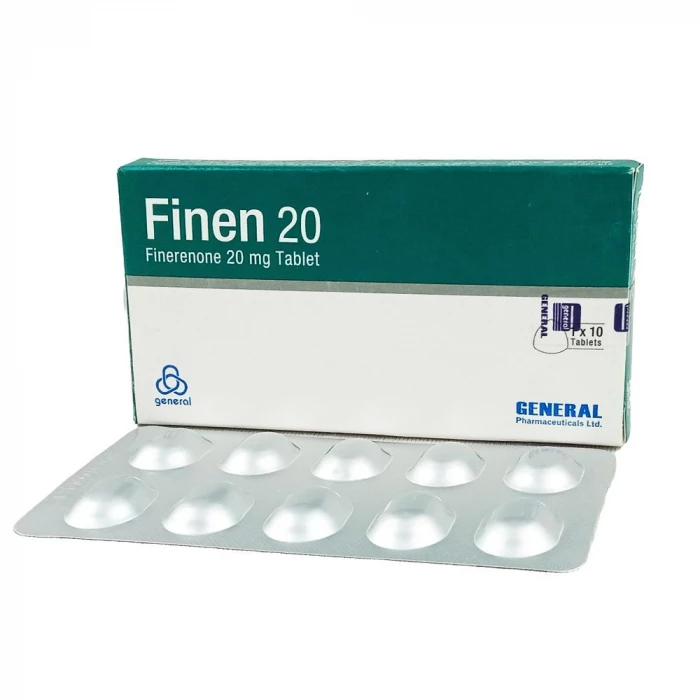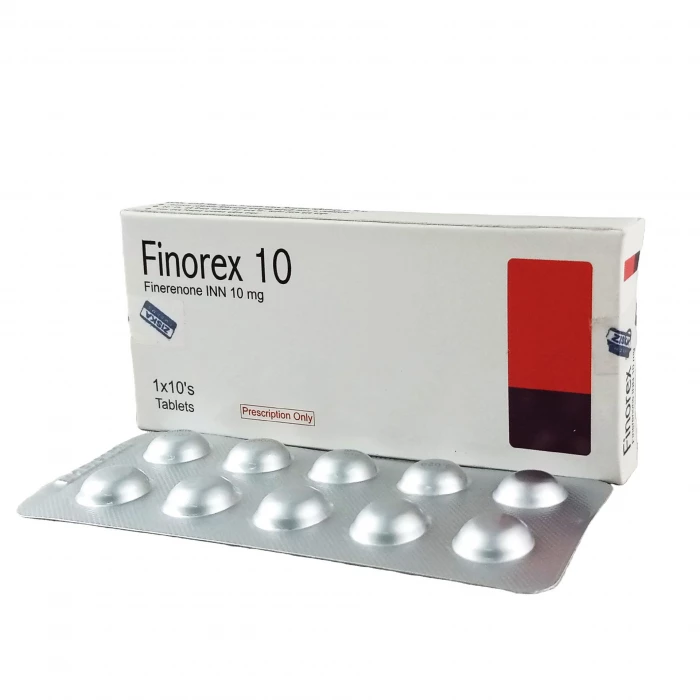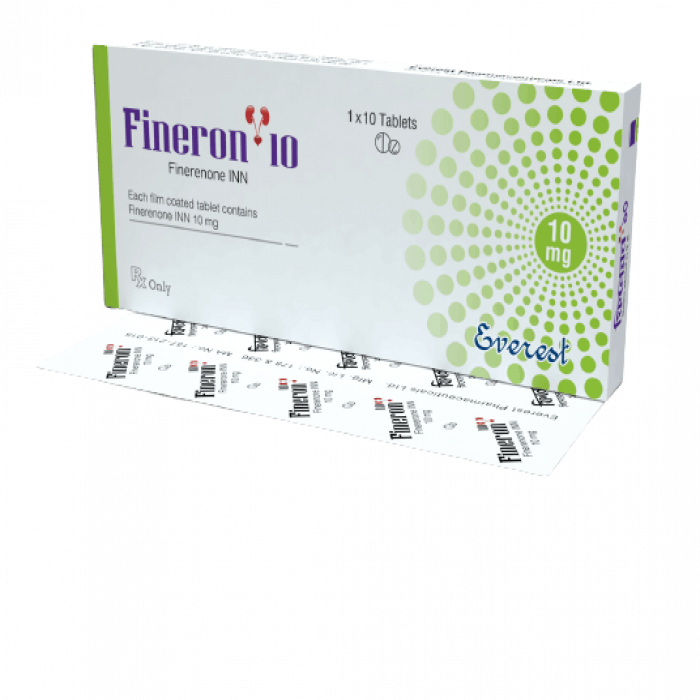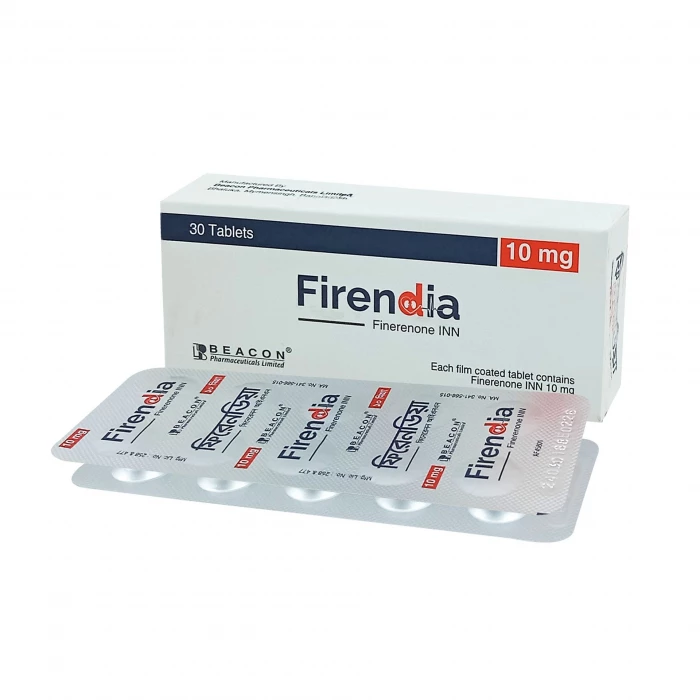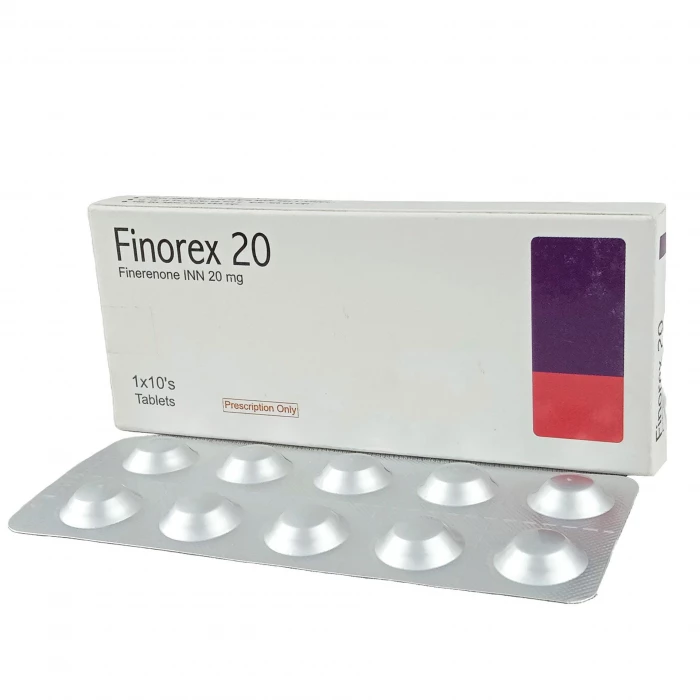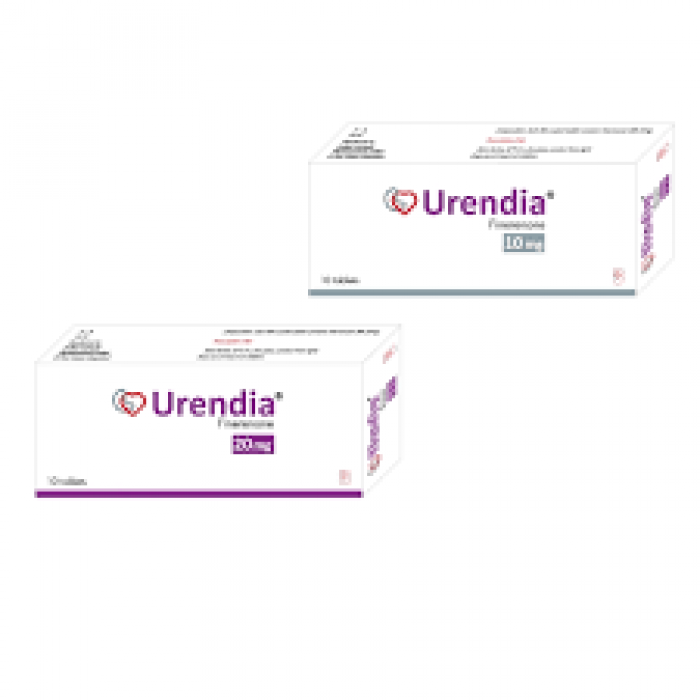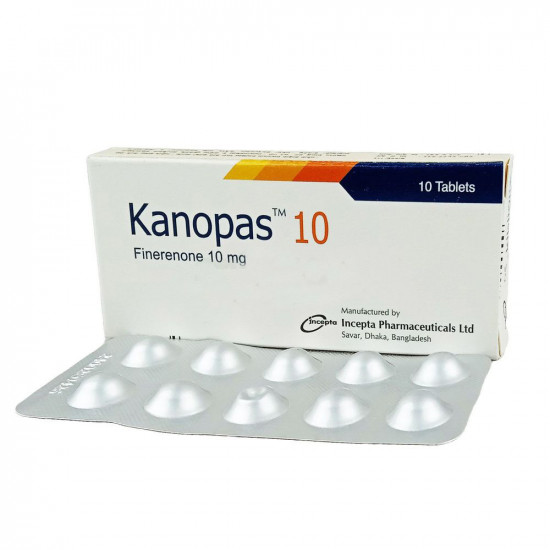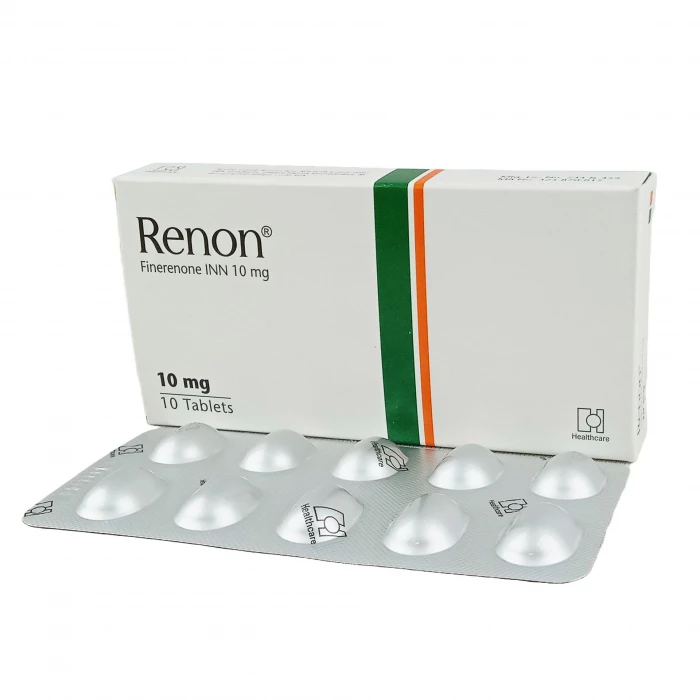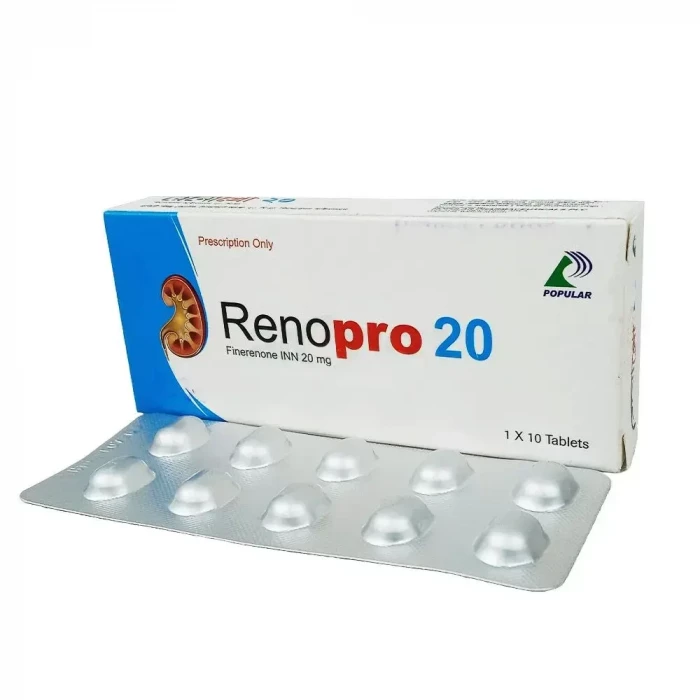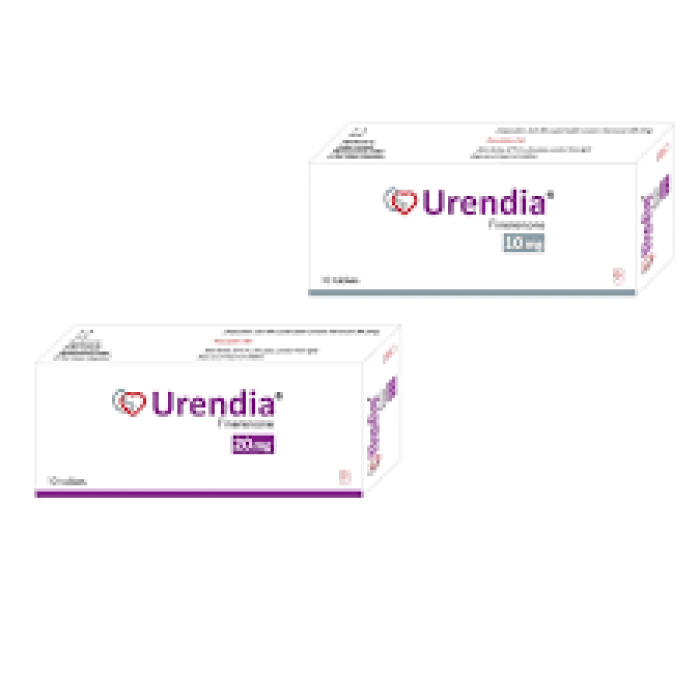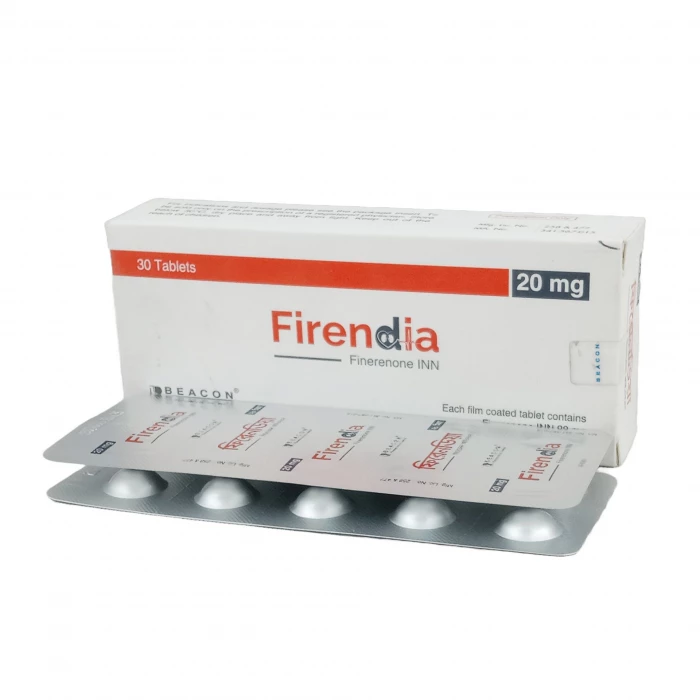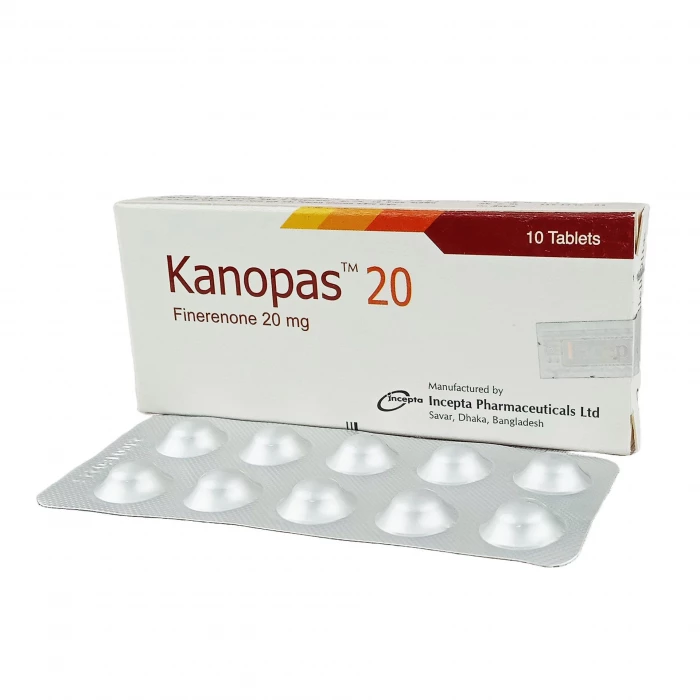
✔ 100% Authentic Product
👁️ Currently Viewing 2818
Kanopas 20mg Tablet 10pcs
Kanopas 20 is a prescription medication used in adults who have diabetes-related kidney disease
- Reduces the chance of worsening kidney problems and lowers the risk of severe heart issues.
- Helps prevent further decline in kidney function
- Reduces the risk of heart attacks
- Reduces the requirement for hospitalization caused by heart problems
Discount
Price: ৳ 1,128
MRP:
৳
1200
6%
Off

100% Genuine Products, Guaranteed

Safe & Secure Payments, Always

Fast, Secure & Efficient Delivery

Proper Packaging
 Cash on Delivery - All over Bangladesh
Cash on Delivery - All over Bangladesh Regular Delivery - 12-24 Hours, Dhaka City* Charge Tk.39-59
Regular Delivery - 12-24 Hours, Dhaka City* Charge Tk.39-59 Regular Delivery - 24-48 Hours, Other Cities* Charge Tk.99-110
Regular Delivery - 24-48 Hours, Other Cities* Charge Tk.99-110
 ফ্রি ডেলিভারিঃ - ৯৯৯ টাকা+ অর্ডারে, ঢাকা
শহরে
ফ্রি ডেলিভারিঃ - ৯৯৯ টাকা+ অর্ডারে, ঢাকা
শহরে ফ্রি ডেলিভারিঃ - ২৯৯৯ টাকা+ অর্ডারে, ঢাকার
বাহিরে
ফ্রি ডেলিভারিঃ - ২৯৯৯ টাকা+ অর্ডারে, ঢাকার
বাহিরে
100% Genuine Products, Guaranteed
Safe & Secure Payments, Always
Fast, Secure & Efficient Delivery
Proper Packaging
 Cash on Delivery - All over Bangladesh
Cash on Delivery - All over Bangladesh Regular Delivery - 12-24 Hours, Dhaka City* Charge Tk.39-59
Regular Delivery - 12-24 Hours, Dhaka City* Charge Tk.39-59 Regular Delivery - 24-48 Hours, Other Cities* Charge Tk.99-110
Regular Delivery - 24-48 Hours, Other Cities* Charge Tk.99-110 ফ্রি ডেলিভারিঃ - ৯৯৯ টাকা+ অর্ডারে, ঢাকা
শহরে
ফ্রি ডেলিভারিঃ - ৯৯৯ টাকা+ অর্ডারে, ঢাকা
শহরে ফ্রি ডেলিভারিঃ - ২৯৯৯ টাকা+ অর্ডারে, ঢাকার
বাহিরে
ফ্রি ডেলিভারিঃ - ২৯৯৯ টাকা+ অর্ডারে, ঢাকার
বাহিরে
✅ Description:
Finerenone is prescribed for managing chronic kidney disease (CKD) linked to type 2 diabetes. It is effective in reducing the risk of severe kidney function decline, end-stage kidney disease, cardiovascular death, non-fatal heart attacks, and hospitalization due to heart failure. It also significantly lowers the risk of new-onset heart failure.
Safety Advices

Alcohol
UNSAFE
Consult your doctor as the interaction with alcohol is unknown.

Pregnancy
CONSULT YOUR DOCTOR
Use with caution; not recommended unless necessary.

Breastfeeding
CONSULT YOUR DOCTOR
Unsafe; can harm your child.

Driving
CAUTION
Generally safe, but be cautious if experiencing weakness or tiredness.

Kidney
SAFE IF PRESCRIBED
Safe when prescribed by a doctor.

Liver
CAUTION
Exercise caution if you have liver impairment; consult your doctor.
✔️ Uses of Kanopas 20
Management of chronic kidney disease associated with type 2 diabetes
✔️ How does Kanopas 20 work?
Finerenone contains finerenone, a non-steroidal mineralocorticoid receptor antagonist. It blocks certain hormones that can cause damage to the kidneys and heart.
✔️ Side Effects of Kanopas 20
Possible Side Effects:
- High potassium levels (hyperkalemia)
- Weakness or fatigue
- Nausea
- Numbness in hands and lips
- Muscle cramps
- Low sodium levels (hyponatremia)
- Headache
- Confusion
- Muscle weakness or spasms
- High uric acid levels (hyperuricemia)
✔️ How to take Kanopas 20
- Swallow Kanopas 20 tablets whole with a glass of water. Do not crush, chew, or break them.
- Your doctor will prescribe the appropriate dose and duration based on your condition.
✔️ Quick Suggestions:
- Include plenty in your daily diet for essential vitamins and minerals.
- Incorporate beans, pulses, fish, eggs, or lean meat to meet your protein needs.
- Reduce intake to support overall health and prevent complications.
- Limit these if advised by your doctor, as high levels can affect kidney function.
- Smoking can harm kidney function and overall health.
- Moderation is key to avoiding strain on the kidneys and liver.
- Ensure you attend all scheduled appointments to monitor liver and kidney function, as well as blood and urine samples. Regular check-ups are essential for early detection and management of any potential issues.
✔️ Indication of Finerenone
Finerenone is used to treat patients with chronic renal damage caused by type 2 diabetes.
✔️ Finerenone: Key Pharmacokinetic Details
- Mechanism of Action: Finerenone is a nonsteroidal, selective antagonist of the mineralocorticoid receptor (MR), which regulates gene transcription via aldosterone and cortisol. It blocks MR-mediated sodium reabsorption and MR overactivation in both epithelial (e.g., kidneys) and nonepithelial (e.g., heart, blood vessels) tissues, which may contribute to fibrosis and inflammation. It does not interact with androgen, progesterone, estrogen, or glucocorticoid receptors.
- Blood Pressure Effects: Patients experienced a reduction in mean systolic blood pressure by 3 mmHg and diastolic blood pressure by 1-2 mmHg within one month, with these effects remaining stable.
- QT Interval: At doses up to four times the maximum approved dose, Finerenone does not significantly prolong the QT interval.
- Absorption: Finerenone is fully absorbed after oral administration with an absolute bioavailability of 44%. Peak plasma concentration (Cmax) occurs between 0.5 and 1.25 hours after dosing.
- Food Effects: High-fat, high-calorie meals do not significantly affect the AUC of Finerenone.
- Distribution: The volume of distribution at steady-state (Vss) is 52.6 L. It is 92% bound to plasma proteins, primarily serum albumin.
- Elimination: The terminal half-life of Finerenone is approximately 2 to 3 hours, with a systemic blood clearance of about 25 L/h.
- Metabolism: Finerenone is predominantly metabolized by CYP3A4 (90%) and CYP2C8 (10%) to inactive metabolites.
- Excretion: About 80% of the administered dose is excreted in the urine.
✔️ Dosage & Administration of Kanopas 20
Recommended Dosage-
- eGFR ≥60 mL/min/1.73 m2: starting dose 20 mg once daily
- eGFR ≥25 to <60 mL/min/1.73 m2: starting dose 10 mg once daily
- eGFR <25 mL/min/1.73 m2: not recommended
For patients who are unable to swallow whole tablets, Finerenone may be crushed and mixed with water or soft foods.
The recommended starting dosage: is 10 mg or 20 mg orally once daily based on estimated glomerular filtration rate (eGFR) and serum potassium thresholds. Increase dosage after 4 weeks to the target dose of 20 mg once daily, based on eGFR and serum potassium thresholds. Tablets may be taken with or without food.
✔️ Interaction
- Drug-Drug Interactions: May interact with antifungal medications (e.g., itraconazole, ketoconazole), HIV medications (e.g., ritonavir, nelfinavir, cobicistat), and certain antidepressants (e.g., nefazodone).
- Drug-Food Interactions: Limit potassium and phosphate intake; avoid grapefruit and grapefruit juice.
- Drug-Disease Interactions: Use with caution if you have high potassium levels, severe kidney impairment, liver issues, heart failure, or Addison’s disease.
✔️ Contraindications
Contraindicated in concomitant use with strong CYP3A4 inhibitors & patients with adrenal insufficiency.
✔️ Pregnancy & Lactation
There are no available data on Kanopas 20 use in pregnancy to evaluate for a drug-associated risk of major birth defects, miscarriage, or adverse maternal or fetal outcomes. Animal studies have shown developmental toxicity at exposures about 4 times those expected in humans. The clinical significance of these findings is unclear. The estimated background risk of major birth defects and miscarriage for the indicated population is unknown. All pregnancies have a background risk of birth defect, loss, or other adverse outcomes. In the U.S. general population, the estimated background risk of major birth defects and miscarriage in clinically recognized pregnancies is 2 to 4% and 15 to 20%, respectively.
There are no data on the presence of finerenone or its metabolite in human milk, the effects on the breastfed infant, or the effects of the drug on milk production. In a pre-and postnatal developmental toxicity study in rats, increased pup mortality and lower pup weight were observed at about 4 times the AUC unbound expected in humans. These findings suggest that finerenone is present in rat milk. When a drug is present in animal milk, the drug will likely be present in human milk. Because of the potential risk to breastfed infants from exposure to Finerenone, avoid breastfeeding during treatment and for 1 day after treatment.
✔️ Precautions & Warnings
- Inform your doctor about any existing health conditions (such as heart, liver, or kidney problems) and other medications you are taking.
- Do not use FINERENONE if you are allergic to any of its components.
- Avoid strong CYP3A4 inhibitors and grapefruit or grapefruit juice while taking FINERENONE.
- Not recommended during pregnancy unless necessary, and should not be used while breastfeeding.
- Not suitable for children under 18 years of age.
✔️ Storage:
Store in a cool, dry place away from sunlight.
⚠️Disclaimer:
At ePharma, we’re committed to providing accurate and accessible health information. However, all content is intended for informational purposes only and should not replace medical advice from a qualified physician. Please consult your healthcare provider for personalized guidance. We aim to support, not substitute, the doctor-patient relationship.




